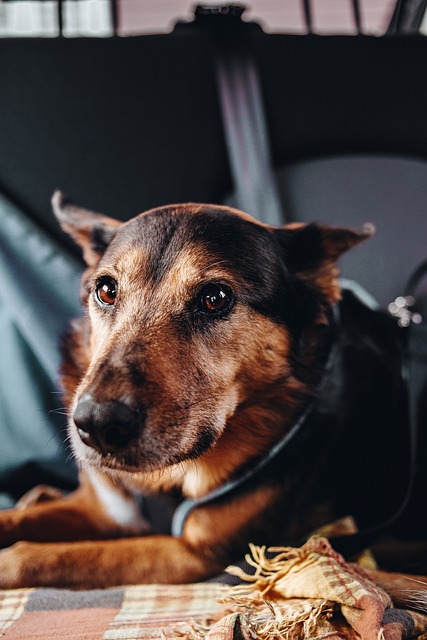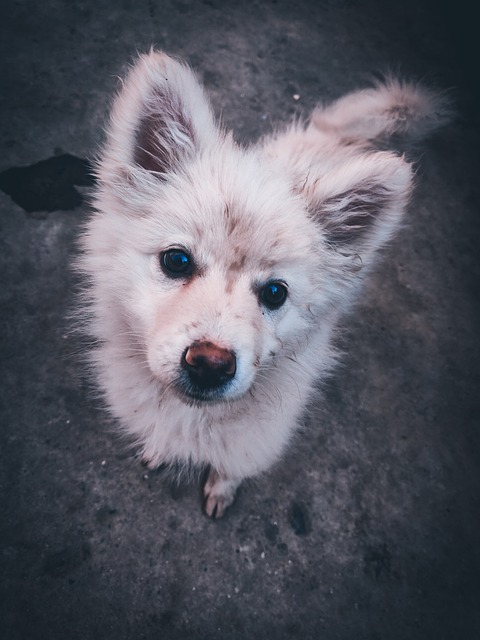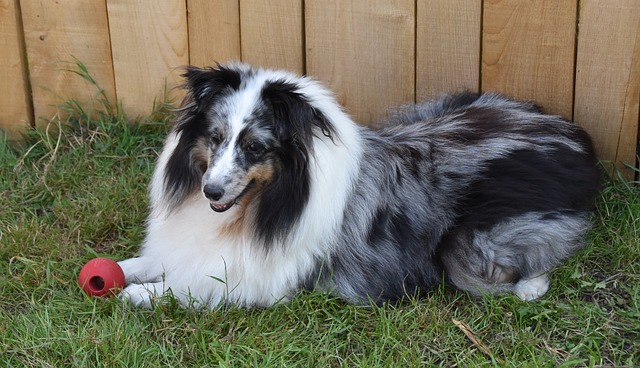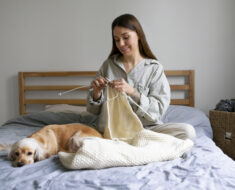Have you ever walked into your dog’s room only to discover a soggy mess on his bed? It can be baffling and frustrating to witness your furry companion peeing on his own cozy spot.
But fear not, as we’re here to unravel the mystery behind this peculiar behavior. In this article, we will explore the possible reasons why your dog may be peeing on his bed.
From medical conditions and anxiety to marking territory, we’ll delve into the various factors that could contribute to this unwanted behavior.

By understanding the underlying causes, you’ll be better equipped to address and resolve this issue for your beloved canine friend.
Now look up at some reasons why do dogs pee on beds? Thus here you can look up why your dog peeing all of a sudden?
Why do dogs pee on beds? And what to do about it?
1. Incomplete house training
Dogs may pee on beds due to incomplete house training. When a dog is not adequately trained to understand where it should relieve itself, it may resort to peeing on beds, which resemble absorbent surfaces.
This behavior can occur in puppies or dogs that have not received proper training or reinforcement of appropriate bathroom habits. To address this issue, it is essential to revisit house training techniques.
This includes consistent scheduling for outdoor bathroom breaks, rewarding desired behavior, and using positive reinforcement.
Additionally, providing dogs with their designated potty area and restricting access to bedrooms can help prevent accidents on beds.
2. Incontinence
Dogs may pee on beds due to incontinence, which refers to the inability to control their bladder. Incontinence can occur in dogs of any age and is more common in older or spayed/neutered females.
Medical conditions such as urinary tract infections, hormonal imbalances, or bladder issues can contribute to this problem.
If a dog is peeing on beds due to incontinence, it is crucial to consult with a veterinarian for a thorough examination and appropriate treatment.
Options may include medication, dietary changes, or management strategies such as using doggy diapers or providing easily accessible potty areas to minimize accidents on beds. Thus here you can check out how to clean a dog bed foam?
3. Marking
Dogs may pee on beds as a form of marking behavior. Marking is a natural instinct for dogs to establish their territory and communicate with other animals. By urinating on beds, dogs leave their scent as a way of claiming the area as their own.

Marking behavior is more commonly observed in intact males but can also be seen in females and neutered/spayed dogs. To address marking, it is essential to first rule out any underlying medical conditions. Neutering or spaying can help reduce marking behavior.
Additionally, providing dogs with appropriate outlets for scent marking, such as designated outdoor areas or specific objects, and using positive reinforcement-based training to redirect the behavior can help mitigate marking on beds.
4. Submission
Dogs may pee on beds as a form of submission. Submissive urination is typically seen in young dogs or those with a timid disposition. When they feel anxious, intimidated, or want to display submission, they may involuntarily urinate.
This behavior is their way of communicating their non-threatening status and avoiding conflict. To address submissive urination, it’s important to create a calm and supportive environment for the dog. Avoid scolding or punishment, as it can worsen the issue.
Instead, focus on building confidence through positive reinforcement training, socialization, and gradually exposing the dog to new experiences.
Providing a designated potty area and avoiding overwhelming situations can also help reduce submissive urination on beds.
5. Fear
Dogs may pee on beds due to fear. Fear-induced urination is common in dogs that feel frightened, anxious, or threatened. When faced with a scary situation or encountering unfamiliar people or animals, they may involuntarily release urine as a coping mechanism.
To address this issue, it is crucial to create a safe and supportive environment for the dog. Avoid situations that trigger fear and gradually expose the dog to them in a controlled and positive manner.
Positive reinforcement training, desensitization, and counter-conditioning techniques can help build the dog’s confidence and reduce fear-related urination.
Consulting with a professional dog trainer or behaviorist can provide additional guidance in managing fear-based urination on beds. Here you can check out why is my dog scratching my bed sheet?
6. Young Dogs Are Excited
Dogs may pee on beds because they are excited, especially in the case of young dogs. When dogs become overly excited, such as during playtime or when greeted by their owners, they may lose control of their bladder and accidentally urinate.
This is known as excitement urination and is more common in puppies or young dogs with less bladder control. To address this issue, it is important to remain calm when interacting with an excited dog, as excitement can amplify their urge to urinate.
Avoid excessive physical stimulation and provide frequent potty breaks to prevent accidents. Over time, as the dog matures and gains better bladder control, excitement urination tends to decrease.
7. Dogs Engage in Territorial Marking
Dogs may pee on beds as a form of territorial marking. By urinating on beds, dogs leave their scent and mark their territory. This behavior is more common in intact males but can also be seen in females and neutered/spayed dogs.
Dogs engage in territorial marking to establish their ownership and communicate with other animals. To address this issue, it is important to first rule out any underlying medical conditions.

Neutering or spaying can help reduce marking behavior.
Providing dogs with appropriate outlets for scent marking, such as designated outdoor areas or specific objects, and using positive reinforcement-based training to redirect the behavior can help minimize marking on beds.
Why Urinating in His Bed Occurs in Dogs?
Urinating in their bed can occur in dogs due to various reasons. These can include incomplete house training, medical issues such as urinary tract infections or incontinence, marking behavior, fear or anxiety, excitement, or even a lack of proper bathroom access.
It is crucial to identify the underlying cause to effectively address the problem. Consulting with a veterinarian can help rule out any medical conditions.
Revisiting house training techniques, providing regular potty breaks, managing anxiety or fear through positive reinforcement training, and creating a comfortable and secure environment are important steps in resolving the issue of urinating in a dog’s bed.
Moreover here you can check out why does your dog scratch the bed?
How to stop my dog fro peeing on my bed?
1. Give your pup plenty of opportunities to go potty outside
To stop your dog from peeing on your bed, it’s crucial to give your pup plenty of opportunities to go potty outside. Establishing a consistent schedule for bathroom breaks is key.
Take your dog outside frequently, especially after meals, naps, playtime, or waking up in the morning. Designate a specific potty area and use verbal cues or commands to encourage elimination.
When your dog successfully goes potty outside, praise and reward them with treats or verbal affirmations.
Consistency and positive reinforcement will help your dog understand that outside is the appropriate place to relieve themselves, reducing the likelihood of accidents on your bed.
2. Clean urine- soiled areas thoroughly
To stop your dog from peeing on your bed, it is important to clean urine-soiled areas thoroughly. Dogs have a keen sense of smell and may be attracted back to previously marked spots. Start by blotting up any fresh urine with paper towels, being careful not to rub it into the fabric.
Then, use an enzyme-based cleaner specifically designed for pet urine to eliminate the odor. Follow the product instructions and thoroughly clean the affected area, including the mattress, bedding, and any other affected items.
Removing the scent will help deter your dog from revisiting and urinating on the bed again, reinforcing the idea that the bed is not an appropriate spot for elimination.
3. Restrict access to your bed
To stop your dog from peeing on your bed, it can be effective to restrict their access to your bed. This can be achieved by closing the bedroom door, using baby gates, or utilizing a crate or playpen.
By physically preventing your dog from reaching the bed, you create a clear boundary and reinforce the idea that the bed is off-limits for elimination.

Instead, provide your dog with their own comfortable sleeping area, such as a dog bed or crate, and make it a positive and inviting space.
Over time, your dog will learn that their designated area is where they should rest, reducing the likelihood of accidents on your bed.
4. Visit a Vet
If your dog is repeatedly peeing on your bed despite your efforts to address the issue, it is important to visit a veterinarian.
There could be underlying medical reasons behind this behavior, such as urinary tract infections, bladder issues, or hormonal imbalances. A vet can perform a thorough examination, run necessary tests, and provide a proper diagnosis.
They may recommend appropriate treatments or medications to address any health conditions that may be contributing to the inappropriate urination.
Consulting with a vet is crucial to rule out any medical causes and ensure your dog’s overall health and well-being.
5. Provide House Training
To stop your dog from peeing on your bed, providing proper house training is essential. This involves teaching your dog where it is appropriate to eliminate and reinforcing good bathroom habits.
Establish a consistent schedule for taking your dog outside for potty breaks, especially after meals, naps, or playtime. Use positive reinforcement techniques such as praise, treats, or a clicker when your dog eliminates in the designated potty area.
Supervise your dog closely indoors and interrupt any signs of sniffing or circling behavior that may indicate a need to urinate.
Redirect them to the designated potty spot. With patience, consistency, and positive reinforcement, your dog can learn to associate outdoor potty breaks with proper elimination, reducing accidents on your bed.
6. Apply Stain and Odor Remover
To stop your dog from peeing on your bed, applying a stain and odor remover is crucial. Even after cleaning the urine-soiled area, residual smells can remain, which may attract your dog back to the spot for future urination.
By using a specialized stain and odor remover, you can effectively eliminate the lingering scent. These products are designed to break down the enzymes in urine, fully eliminating the odor and discouraging your dog from urinating in the same area again.
Properly following the instructions on the remover will help ensure thorough cleaning, reducing the chances of your dog being attracted back to your bed for elimination.
7. Use a Smaller Crate
Using a smaller crate can be a helpful strategy to stop your dog from peeing on your bed. Dogs have a natural instinct to keep their sleeping area clean, and a smaller crate limits their space, making them less likely to eliminate inside it.
The reduced space encourages them to hold their bladder and wait until they can be taken outside to relieve themselves.
It is important to choose a crate that is appropriately sized for your dog’s comfort and ensure it is properly ventilated and includes bedding.
By using a smaller crate, you create a confined space that encourages your dog to develop better bladder control, reducing the likelihood of accidents on your bed.
8. Offer Praise
Offering praise is an effective way to stop your dog from peeing on your bed. Positive reinforcement is a powerful tool in modifying behavior.
When your dog eliminates in the appropriate spot, such as outside or their designated potty area, offer immediate praise and rewards. This can include verbal praise, enthusiastic petting, treats, or a favorite toy.
By associating proper elimination with positive experiences, your dog will be motivated to repeat the behavior.
Praise helps reinforce the idea that peeing in the designated area is desirable, while accidents on the bed are not. Consistent praise encourages your dog to make the right choice and reduces the likelihood of future accidents on your bed.
9. Correct the Mistake in the Moment
Correcting the mistake in the moment is crucial to stop your dog from peeing on your bed. When you catch your dog in the act of urinating on the bed, it’s important to intervene immediately.
Use a firm but gentle voice to say “No” or use a cue word that you’ve previously established to indicate that this behavior is not acceptable. Avoid harsh punishment, as it can create fear and anxiety.
Quickly and calmly redirect your dog to the appropriate potty area, such as outside or their designated spot. Once they finish eliminating in the correct place, offer praise and rewards to reinforce the desired behavior.
By correcting the mistake in the moment, you communicate to your dog that peeing on the bed is not acceptable, encouraging them to choose the appropriate location for elimination.
10. Purchase Dog Diapers
Purchasing dog diapers can be a practical solution to stop your dog from peeing on your bed.
Dog diapers are specially designed to fit comfortably on dogs and prevent any urine leakage. They act as a barrier between your dog’s urinary accidents and your bed, keeping the bedding clean and dry.
Diapers are particularly useful in cases where other methods have not been successful or during times when your dog’s bladder control is compromised, such as during illness or after surgery.
When using diapers, it’s important to ensure a proper fit and change them regularly to maintain hygiene. This can be an effective temporary or long-term solution to prevent your dog from urinating on your bed.
Fully washable dog beds for dogs who struggle with peeing the bed.
Related faq’s
Why does my dog pee on his own bed?
There can be several reasons why a dog pees on its own bed. It could be due to incomplete house training, incontinence, marking behavior, fear or anxiety, a medical condition, or a lack of access to proper bathroom facilities.
It’s essential to identify the underlying cause by consulting a veterinarian and addressing any medical issues or behavioral concerns.
Proper house training, creating a calm and secure environment, and providing regular bathroom opportunities can help prevent a dog from peeing on its own bed.
How do I stop my dog from peeing in his bed?
To stop your dog from peeing in his bed, there are several steps you can take. First, ensure that your dog has been properly house trained and provide regular opportunities for bathroom breaks. If there are any medical issues, consult with a veterinarian for appropriate treatment.
Clean any soiled areas thoroughly to remove lingering scents. Consider using a smaller crate or restricting access to the bed.
Offer praise and rewards for using the designated potty area and correct accidents in the moment. Providing a comfortable and secure sleeping area for your dog can also help prevent bed-wetting incidents.
Why is my 4 month old puppy peeing on the bed?
A 4-month-old puppy peeing on the bed can be attributed to various reasons. Firstly, at this age, puppies are still developing bladder control and may not have fully grasped house training. They may also be experiencing excitement or anxiety, leading to accidents.
Additionally, the puppy’s small bladder size might make it challenging for them to hold urine for extended periods.
Ensuring consistent and frequent potty breaks, reinforcing positive behavior, and using crate training can help address the issue. It is also recommended to consult with a veterinarian to rule out any potential medical causes.
Conclusion:
In conclusion, understanding why your dog pees on his bed is essential for maintaining their well-being and addressing any underlying issues.
Several factors could contribute to this behavior, including medical conditions, anxiety, marking territory, or incomplete house training. It is crucial to consult with a veterinarian to rule out any medical causes and implement appropriate treatments.
Additionally, providing a comfortable and secure sleeping area, consistent potty training, and addressing any anxiety or stress can help prevent your dog from peeing on his bed.
Remember, patience, positive reinforcement, and a holistic approach are key to resolving this issue and ensuring your furry friend’s comfort.
Now, let’s dive deeper into the topic. Have you ever experienced your dog peeing on their bed? What steps have you taken to address this behavior? Share your thoughts in the comments below, and let’s support each other in finding solutions for our beloved pets.






